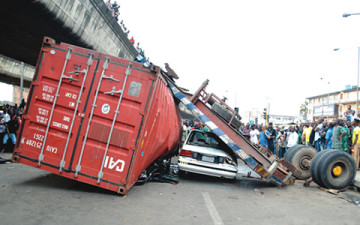Nigeria has witnessed a significant increase in truck accidents over the past few years, which has led to loss of human lives, properties and economic resources.
Recently, nine people including two children and seven adults died after a truck conveying a 20 feet container fell on top of a commercial bus in the Ojuelegba area of Lagos. Investigations revealed that the bus was picking up passengers when the truck lost control and fell over the side of the bridge.
Days after the Ojuelegba bloody accident, the Ikotun area of the Alimosho LGA, also saw a fully-loaded petroleum product tanker crushed three tricycles, killing two people instantly while four others were rescued and taken to the hospital. After the Ikotun accident, there had been a few others, and as with previous ones, lives were also lost.
Findings revealed that last year, the Lagos State Traffic Management Agency (LASTMA) recorded more than 100 articulated truck accidents between January and July. We also recall that the Federal Road Safety Commission (FRSC) last year said that in 2018, Nigeria lost over N39 billion to tanker and trailer-related road crashes.
Statistics revealed that a total of 650 tankers and trailers were involved in crashes in 2018, with over 90 percent of the affected vehicles having been used for haulage transportation for over 30 years.
A few years ago, the Nigerian Ports Authority (NPA) introduced the Minimum Safety Standard (MSS) for trucks coming into the port.
The enforcement of Minimum Safety Standard means that every truck that enters the port must have passed the minimum standard and certified okay to play Nigerian roads with the cargo that they convey.
Currently, the responsibility of ensuring the Minimum Safety Standard is being carried out by the Truck Transit Parks (TTP) on behalf of the NPA. This, according to the contract of engagement between the NPA and Truck Transit Parks means that the trucks must now be certified electronically and their road worthiness and integrity ascertained.
According to information made available to this newspaper, the causes of truck accidents vary as the government, state actors as well as owners and drivers of the trucks are to be blamed.
Some of these factors include, poorly-
It is a fact that, Nigeria’s road network is in dire need of an upgrade. Most of the roads are in terrible condition, making it difficult for drivers to maintain control of their vehicles. Also the lack of road signs and traffic lights make it challenging for drivers to navigate the roads.
Similarly, the truck drivers should avoid overloading, which is a common practice among truck drivers in Nigeria. It significantly affects the weight balance of the truck, making it difficult for the driver to control the vehicle. In some cases, overloaded trucks cause serious road accidents that lead to fatalities.
In addition, truck drivers are expected to play a significant role in reducing truck accidents. However, most of the truck drivers in Nigeria are untrained, and some of them drive under the influence of drugs or alcohol. Also the fatigue and the long hours spent on the road can also cause driver errors, which can lead to fatal accidents.
The state actors and government agencies saddled with the responsibility of ensuring safety on our roads must be proactive and not reactive, they must enforce strict penalties for traffic offenses, such as overloading, driving under the influence of drugs or alcohol, and non-compliance with traffic regulations. This will encourage drivers to drive more responsibly and reduce truck accidents.
Traffic regulators such as: Federal Road Safety Corp, (FRSC), Lagos State Traffic Management Authority (LASTMA) Vehicle Inspection Service (VIS) including government agency such as the Nigerian Ports Authority (NPA) and the terminal operators must enforce mandatory training and certification of truck drivers.
The training should cover road safety, and other essential skills that are necessary to operate a truck safely. The truck owners must put their vehicles in good serviceable condition, and conduct regular inspections to ensure that they are roadworthy.
The recent collaboration between the FRSC, NPA, truck drivers, LASTMA, terminal operators and other traffic management agencies towards minimising road crashes involving containers is a welcome idea, and should be sustained
Also the maintenance of trucks is critical in reducing truck accidents. In Nigeria, most of the trucks are poorly-maintained, leading to frequent mechanical faults that cause accidents.
There is no gainsaying that the consequences of truck accidents are devastating, both for the victims and society at large. Truck accidents result in the loss of human lives, property damage, and significant economic losses. The victims and their families suffer immeasurable emotional and financial losses, while society is burdened with the cost of treatment, rehabilitation, and compensation for the victims.
To reduce truck accidents on our roads, all stakeholders must work together. The federal and state governments, truck owners, and drivers including NPA that regulates the ports must take proactive steps to address this issue.
We call on government at all levels, to invest in upgrading the road network, fixing potholes as well as providing adequate road signs and traffic lights to make the roads safer for drivers.
The consequences of truck accidents are devastating, and it is time for all stakeholders to take action to reduce these accidents. The government, truck owners, drivers and terminal operators must work together to improve the road infrastructure, enforce traffic regulations, train drivers and certify trucks, before they are put on the highways as incessant truck accidents in Nigeria have become a major concern for the government and society at large.
Finally, we maintain that truck accidents is a failure of government agency, and for accidents to be curtail, there is need for enforcement of safety standards by these organisation.
shippingposition
Kindly like us on Facebook/twitter















